| Srl | Item |
| 1 |
ID:
111676
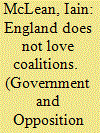

|
|
|
|
|
| Publication |
2012.
|
| Summary/Abstract |
In mid-2011, it certainly looks as if England does not love coalitions, or at any rate the coalition that is governing it. The phrase was coined by Benjamin Disraeli in 1852. This article begins with the context in which Disraeli spoke, then gradually broadens its scope from England to the UK to the set of advanced democracies. Modern political economy has a great deal to say on the subject of coalitions. In conclusion we return to the prospects for future coalitions and minority governments in the UK.
|
|
|
|
|
|
|
|
|
|
|
|
|
|
|
|
| 2 |
ID:
111678
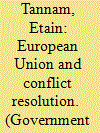

|
|
|
|
|
| Publication |
2012.
|
| Summary/Abstract |
The aim of this article is to determine the EU's effect on British-Irish and Greek-Turkish cooperation. It examines the EU's actual and potential role in fostering British-Irish and Greek-Turkish cooperation as well as its policies to Northern Ireland and Cyprus themselves. Domestic bureaucratic capacity and institutional design are put forward as explanations for the success of the British-Irish relationship rather than EU membership per se. In the case of Cyprus, the article suggests that increased bilateral cooperation with respect to disputed territory is unlikely to occur in the absence of faster bureaucratic change in both Greece and Turkey. EU membership is not a causal factor in the evolution of cooperation and conflict resolution.
|
|
|
|
|
|
|
|
|
|
|
|
|
|
|
|
| 3 |
ID:
111677
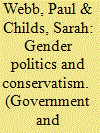

|
|
|
|
|
| Publication |
2012.
|
| Summary/Abstract |
Can conservatives be feminists? This article examines the issue by exploring the case of the British Conservative Party, drawing on a new survey of party members. Under David Cameron's leadership, reforms have been made to the party's parliamentary selection procedures and distinct women's policies developed, thus addressing both the descriptive and substantive representation of women. We examine party members' attitudes towards three types of gender issue: basic orientations towards gender roles and relations; specific policy measures relevant to the substantive representation of women; and the descriptive representation of women. Detailed empirical analysis reveals that there is significant support for progressive liberal feminist positions on each of these dimensions in the party, and that sex, age and basic ideological dispositions drive such attitudes to varying degrees. Even so, support for a liberal feminist position on the descriptive representation of women - that is, the aspect of gender politics where the leadership has been most active - remains on the whole quite limited.
|
|
|
|
|
|
|
|
|
|
|
|
|
|
|
|
| 4 |
ID:
111680
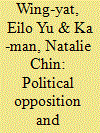

|
|
|
|
|
| Publication |
2012.
|
| Summary/Abstract |
This article examines the nature of political opposition in the Macao Special Administrative Region (MSAR) to give us an understanding of its role in and approach to political reform in the territory. It explores the emergence of the pro-democracy opposition in Macao since the end of the colonial era and the self-perception of pro-democratic opposition groups in the MSAR regime, and argues that the majority of opposition groups perceive themselves as 'loyal' opponents to the current regime. The groups aim at checking the authorities in the scope of the constitution as loyal constituents. Their assumption of this role is the result of several environmental factors, including a relatively weak civil society, a lack of resources and a pro-government media.
|
|
|
|
|
|
|
|
|
|
|
|
|
|
|
|
| 5 |
ID:
111679
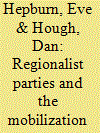

|
|
|
|
|
| Publication |
2012.
|
| Summary/Abstract |
Analysis of political regionalism and regionalist parties has traditionally neglected the case of Germany. We argue that this is a curious ommission. This article looks to redress this balance by applying frameworks created for understanding the determinants of regionalist party success to the Bavarian Christian Social Union (CSU) and the eastern Germany Party of Democratic Socialism (1990-2005, PDS). Although very different in terms of their politics, both parties have been successful as they have followed strategies and tactics evident in the broader regionalist parties' literature. This article therefore deepens our knowledge of regionalism in Germany, while also testing regionalist literatures in a new country-context.
|
|
|
|
|
|
|
|
|
|
|
|
|
|
|
|